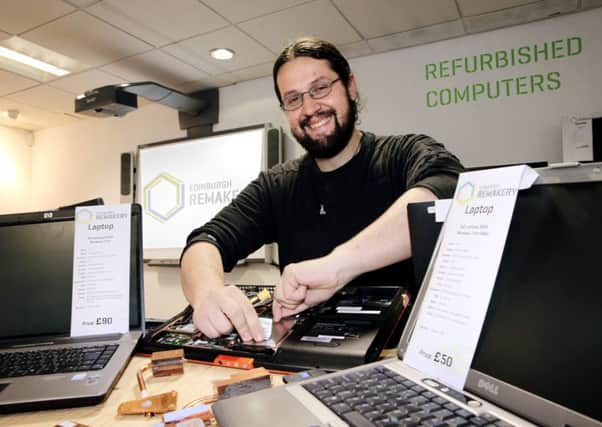Scotland named one of world's top '˜circular economy' nations


Now the Scottish Government has been named as a finalist in the world’s premier circular economy awards, which celebrate the strides made in the move away from our disposable culture.
It has been estimated that creating a circular economy, which finds profitable uses for waste while promoting remanufacture and alternatives to ownership, could save around £1.5 billion a year in Scotland alone, while creating a new generation of jobs and skills.
Advertisement
Hide AdAdvertisement
Hide AdIt could also reduce the country’s carbon emissions by around 11 million tonnes by 2050, it has been claimed.
The Scottish Government, which has placed the circular economy at the heart of its economic and manufacturing strategy, faces competition from public organisations in South Africa, China and Canada at the awards.
Winners of The Circulars will be announced at the Davos World Economic Forum in Switzerland later this month.
Iain Gulland, chief executive of Zero Waste Scotland, said the country had a “commitment at the highest level” to the creation of a circular economy with the issue now at the heart of the government’s economic and manufacturing strategies. “The benefits of adopting a more circular economy are huge – in terms of investment, jobs, and the environmental benefits of improved resource efficiency and less waste,” he said.
“As a society we know we can’t carry on consuming as we have. With a proven business case both environmentally and economically, it is in Scotland’s interests not just to adopt a more circular economy but to lead on it.”
Scotland’s place on the shortlist for the prestigious award reflects several years of work to promote a circular economy, with 25 companies now supported by Zero Waste Scotland to work within the model and dozens more seeking a share of an £18m investment fund to get their businesses off the ground.
Gulland said Scotland was leading the way in driving innovation from the “take, make, dispose” model at a time when many countries were just beginning to think about the potential of decoupling growth from the use of diminishing natural resources.
Companies which have forged ahead include Ogilvy Spirits of Forfar, which turns low-grade potatoes into vodka, and CelluComp, of Burntisland, which creates a new generation of industrial paint using root vegetable waste.
Advertisement
Hide AdAdvertisement
Hide AdJaw Brew, based in Glasgow, is working with Aulds family bakers to brew low-alcohol beer using leftover morning rolls. The first commercial batch is due this year.
Gulland added that interest in the circular economy approach was growing across Scotland. Almost 100 firms applied for a share of the £18m fund, which is supported by the Scottish Government and the European Regional Development Fund, with 40 projects invited to fully develop their bids for a share of the investment cash.
In academia, the Scottish Institute for Remanufacture at the University of Strathclyde has teamed up with business to develop 18 potential commercial projects, with more to follow. The centre is the first of its kind in Europe, with similar ventures based in Singapore, New York and Beijing.
Two large-scale reuse and repair centres, one run by Blythswood Care in the Highlands and the Edinburgh Remakery in the capital, have also helped push the circular economy agenda.
Gulland said a key focus now was to factor reuse and repair into the design of products to give them the longest life possible.
“Making items easy to disassemble and fix, or remanufacture, keeps them in use for longer and prevents valuable materials being wasted,” said Gulland.
“The challenge now is to continue to engage organisations with the circular economy at a time when budgets are tight and businesses need to see a speedy return on their investment. That’s why Zero Waste Scotland continues to offer advice and funding for projects with a circular economy focus, helping to make innovative ideas a reality.”
Gulland added that urging companies to procure and lease long-lasting products which can be repaired– such as lighting systems – would help further push the circular economy agenda into the mainstream.